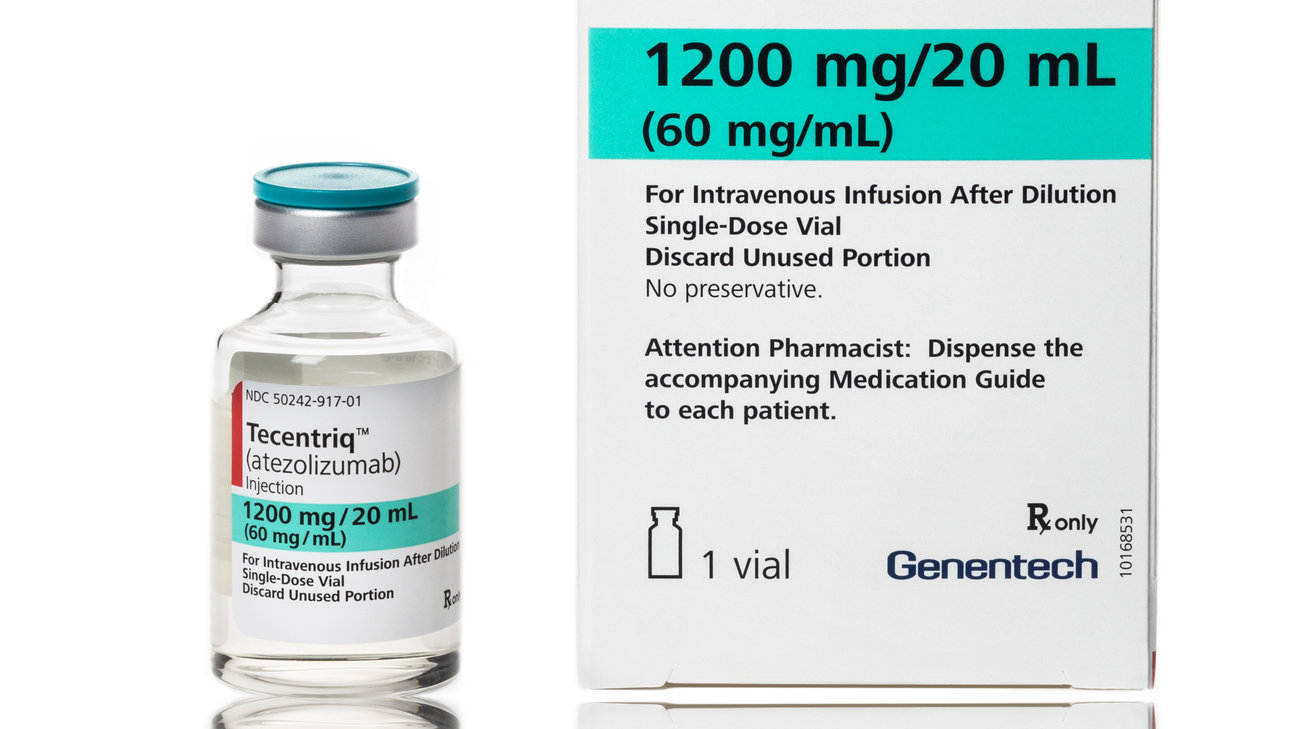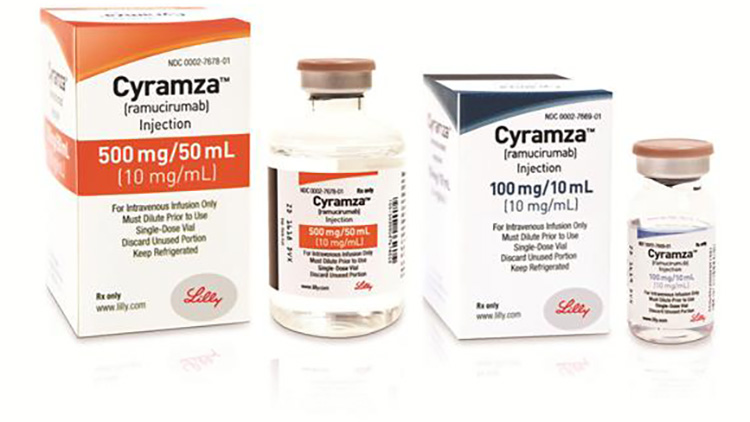Tecentriq (Atezolizumab) vs Cyramza (ramucirumab)
Tecentriq (Atezolizumab) vs Cyramza (ramucirumab)
Tecentriq (atezolizumab) and Cyramza (ramucirumab) are both used to treat certain types of cancer, but they work in different ways. Tecentriq is an immune checkpoint inhibitor that helps the immune system recognize and attack cancer cells, and it is commonly used for types of lung cancer, urothelial carcinoma, and triple-negative breast cancer. In contrast, Cyramza is a vascular endothelial growth factor (VEGF) Receptor 2 antagonist that works by inhibiting the blood supply to tumors and is used for gastric cancer, non-small cell lung cancer, colorectal cancer, and hepatocellular carcinoma. The choice between these medications would depend on the specific type of cancer, its stage, previous treatments, and the patient's overall health and treatment goals, which should be discussed with an oncologist.
Difference between Tecentriq and Cyramza
| Metric | Tecentriq (Atezolizumab) | Cyramza (ramucirumab) |
|---|---|---|
| Generic name | Atezolizumab | ramucirumab |
| Indications | Urothelial carcinoma, non-small cell lung cancer, triple-negative breast cancer, small cell lung cancer | Gastric cancer, non-small cell lung cancer, colorectal cancer, hepatocellular carcinoma |
| Mechanism of action | PD-L1 inhibitor, immune checkpoint inhibitor | VEGFR2 antagonist, angiogenesis inhibitor |
| Brand names | Tecentriq | Cyramza |
| Administrative route | Intravenous infusion | Intravenous infusion |
| Side effects | Fatigue, decreased appetite, nausea, urinary tract infections, fever | Hypertension, diarrhea, headache, hyponatremia |
| Contraindications | History of severe hypersensitivity to atezolizumab or its excipients | Severe hypersensitivity to ramucirumab or any of its excipients |
| Drug class | Monoclonal antibody, Immune checkpoint inhibitor | Monoclonal antibody, VEGF inhibitor |
| Manufacturer | Genentech (Roche) | Eli Lilly and Company |
Efficacy
Tecentriq (Atezolizumab) in Lung Cancer
Tecentriq (Atezolizumab) is an immune checkpoint inhibitor specifically designed to target the PD-L1 protein, which is expressed on tumor cells and tumor-infiltrating immune cells. By blocking this interaction, Tecentriq may enable the activation of T-cells, which can then attack the tumor cells. In the context of lung cancer, Tecentriq has shown efficacy in both non-small cell lung cancer (NSCLC) and small cell lung cancer (SCLC). Clinical trials have demonstrated that Tecentriq, when used alone or in combination with other therapies, can lead to an improvement in overall survival and progression-free survival in certain patient populations with NSCLC. It has also been approved for the first-line treatment of adult patients with metastatic NSCLC whose tumors have high PD-L1 expression and no EGFR or ALK genomic tumor aberrations.
Cyramza (Ramucirumab) in Lung Cancer
Cyramza (Ramucirumab) is a vascular endothelial growth factor receptor 2 (VEGFR2) antagonist that inhibits angiogenesis, a process by which new blood vessels form from pre-existing vessels. This is significant in cancer treatment as tumors require blood vessels to supply nutrients and oxygen for their growth and spread. In lung cancer, Cyramza has been approved for use in combination with docetaxel for the treatment of patients with metastatic non-small cell lung cancer (NSCLC) who have progressed on or after platinum-based chemotherapy. Patients with EGFR or ALK genomic tumor aberrations should have disease progression on FDA-approved therapy for these aberrations prior to receiving Cyramza. Clinical trials have shown that Cyramza, in combination with docetaxel, improves overall survival compared to docetaxel alone in these patients.
Combination Therapy
While both Tecentriq and Cyramza have demonstrated efficacy as individual agents in lung cancer, there is ongoing research into the potential benefits of combining immune checkpoint inhibitors like Tecentriq with angiogenesis inhibitors like Cyramza. The rationale behind this combination is to enhance the anti-tumor immune response by not only activating T-cells but also disrupting the tumor's blood supply. Early clinical trials are exploring the safety and efficacy of such combinations, with the aim of providing new treatment options for patients with advanced lung cancer.
Conclusion
Both Tecentriq (Atezolizumab) and Cyramza (Ramucirumab) have shown significant efficacy in the treatment of lung cancer, offering hope for improved outcomes in a disease that is often diagnosed at an advanced stage. As treatments evolve, the potential for combination therapies that leverage different mechanisms of action is an exciting development in oncology. However, the choice of treatment should always be personalized based on the patient's specific type of lung cancer, molecular profile, and overall health, in consultation with their healthcare provider.
Regulatory Agency Approvals
Tecentriq
-
European Medical Agency (EMA), European Union

-
Food and Drug Administration (FDA), USA

-
Health Canada

-
Pharmaceuticals and Medical Devices Agency (PMDA), Japan

-
Therapeutic Goods Administration (TGA), Australia

-
Medsafe (NZ)

Cyramza
-
European Medical Agency (EMA), European Union

-
Food and Drug Administration (FDA), USA

-
Health Canada

-
Therapeutic Goods Administration (TGA), Australia

-
Medsafe (NZ)

Access Tecentriq or Cyramza today
If Tecentriq or Cyramza are not approved or available in your country (e.g. due to supply issues), you can access them via Everyone.org.
How it works

Make an enquiry
Choose the medicine you want to buy, answer a couple of questions, and upload your prescription to speed things up. We’ll get back to you within 24 hours.


Make an enquiry
Choose the medicine you want to buy, answer a couple of questions, and upload your prescription to speed things up. We’ll get back to you within 24 hours.


Breeze through the paperwork
We'll guide you through the required documents for importing unapproved medicine, ensuring you have all the necessary information.


Get a personalized quote
We’ll prepare a quote for you, including medicine costs and any shipping, administrative, or import fees that may apply.


Receive your medicine
Accept the quote and we’ll handle the rest - sourcing and safely delivering your medicine.

Some text on this page has been automatically generated. Speak to your physician before you start a new treatment or medication.
Let's talk
If you have any questions, call us or send us a message through WhatsApp or email:
Contact us




